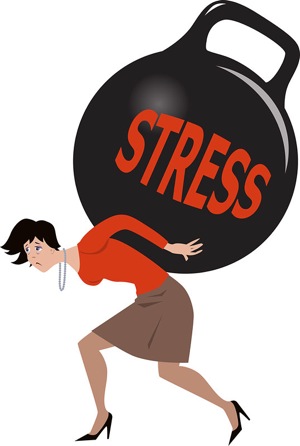
Did you know that approximately two-thirds of all doctor's office visits are for stress-related complaints? Stress is the body's reaction to any situation that is demanding or dangerous. When we experience stress, the body responds by making adrenal hormones (such as epinephrine, norepinephrine, and cortisol) that help your body cope. Commonly called the "fight or flight" response, this is where your blood pressure increases, your hands sweat, and your heart rate and breathing quicken. You've probably felt it during that big job interview, before a first date, during an argument, or being stuck in traffic when you're running late.
Our bodies normalize quickly after responding to short-term stressors. But problems arise with chronic stress, such as financial worries, major life changes, job stress, or an ongoing illness. Other chronic stressors are not lifestyle related but instead metabolic: gut infections, leaky gut, food intolerances, blood sugar imbalances (low blood sugar, insulin resistance, or diabetes), anemia, autoimmune disease, inflammation, and environmental toxins are examples.
It's no wonder adrenal stress is one of most common problems encountered by functional medical practitioners.
How stress damages the body
In chronic stress, the adrenal glands continually produce the hormone cortisol. Known as the "aging hormone" (ever notice how you look older when you are stressed a lot?), chronic high cortisol is linked to:
- high blood pressure
- diabetes
- depression
- insomnia
- suppressed immunity
- insulin resistance
- increased belly fat (muffin top anyone?)
- reduced libido
- bone loss
- low energy
- heart problems
How do you know if you have adrenal stress? You may experience ongoing fatigue, energy crashes, difficulty recovering from long days or stressful events, headaches, difficulty falling and staying asleep, difficulty waking up, mood swings, sugar and caffeine cravings (do you need to refresh from the afternoon blahs?), irritability, lightheadedness between meals, eating to relieve fatigue, dizziness upon standing, gastric ulcers, and hypothyroid symptoms.
Adrenal adaptogens help buffer the damages of stress
Everyone is familiar with classic stress-relief methods such as meditation, exercise, enjoying hobbies, and socializing, but there is much more you can do to support the body's stress response.
One of the most reliable ways to buffer the damages of stress is to take adrenal adaptogens. These are a unique class of healing plants that support healthy adrenal function and help regulate the body's stress response. Adrenal adaptogens include panax ginseng, Siberian ginseng (eleuthero), astragalus, rhodiola, ashwagandha, licorice root, holy basil (tulsi) and schizandra.
In addition to soothing inflammation and increasing energy and brain function, these herbs can also help the body and brain cope with stress. Although they come from the plant world, adrenal adaptogens are potent medicines that should be taken under the supervision of a trained practitioner.
Other smart tools to protect you from the damage of stress
There are other tools to add to your stress-reduction program. For example, phosphatidylserine can help normalize cortisol levels and protect the brain from the damages of stress.
Of course, one should always consider lifestyle habits when addressing stress. Below are lifestyle suggestions to help support healthy adrenal function and stress response:
- Avoid or greatly minimize stimulants.
- Eat nutrient-dense foods.
- Avoid high carbs and sugars.
- Avoid dietary causes of inflammation such as food allergens, high fructose corn syrup, refined foods, and especially industrial seed oils such as canola oil.
- Have adequate intake of essential fatty acids (DHA and EPA).
- Have proper sleep habits.
Though we may live in a world of unrelenting stress, it is possible to successfully manage the body's response through a combination of healthy lifestyle habits and herbal adrenal support.
For more information on how to identify and manage adrenal stress, contact our office.



Latest from the Blog
Breaking Through Cancer Barriers: News Outlets Spotlight High-Dose Vitamin C Therapy
December 5, 2024https://www.yahoo.com/news/pancreatic-cancer-patient-survival-doubled-152722177.html Harnessing the Power of High-Dose Vitamin C in Cancer Treatment Recent advances in cancer treatment research have brought renewed attention to high-dose intravenous (IV) vitamin C, particularly in extending survival rates for patients with advanced different forms of cancer. A groundbreaking phase 2 clinical trial Study Finds demonstrated that combining high-dose IV vitamin C […] Read more
Latest from the Blog
The Dirty Dozen
The “Dirty Dozen” is a list of fruits and vegetables, compiled by the Environmental Working Group (EWG), that you should always eat organically. These produce items are not only delicious and nutrient-rich but also tend to carry high levels of pesticide residues when grown conventionally. By opting for organic versions, you can significantly reduce your […] Read more